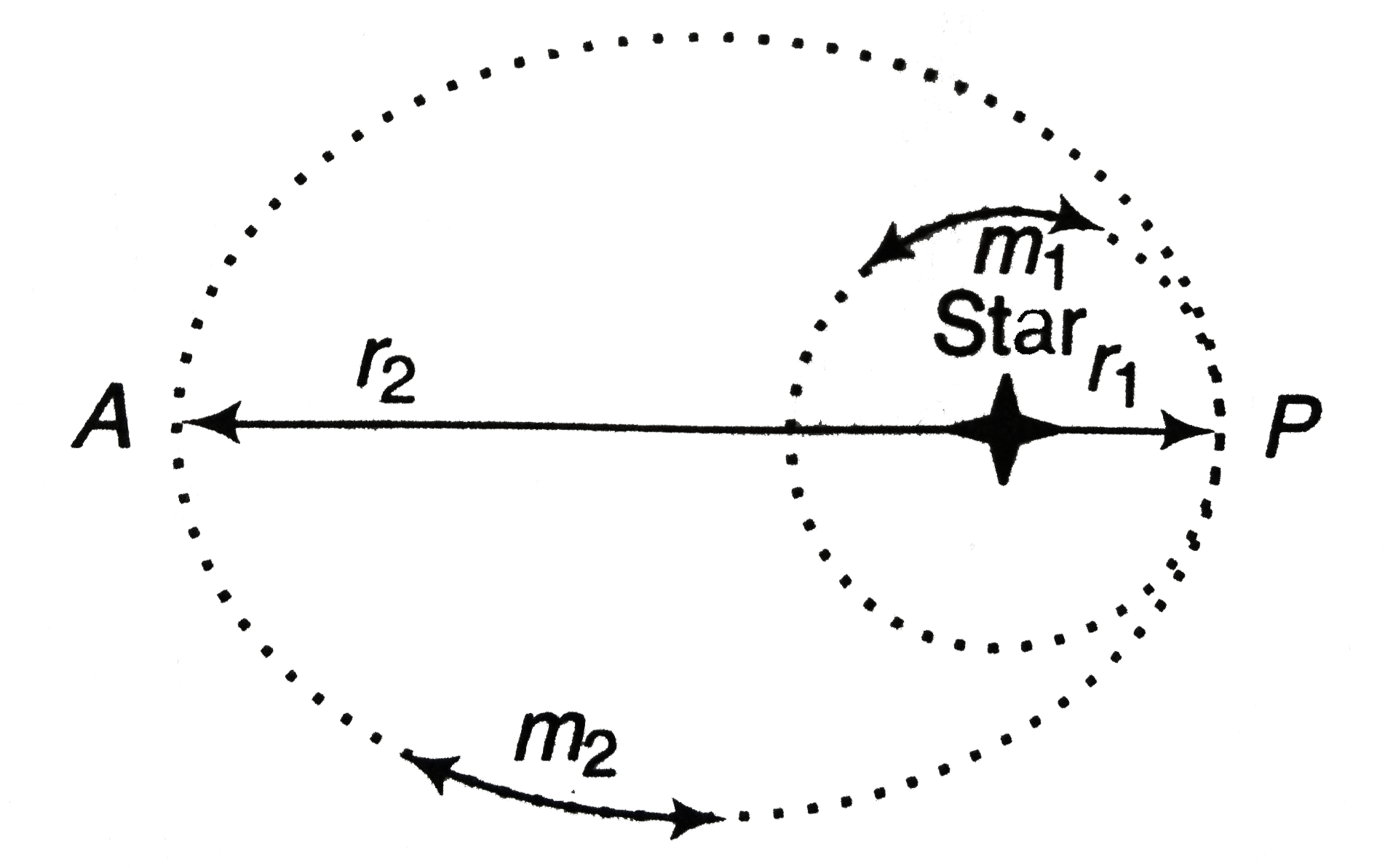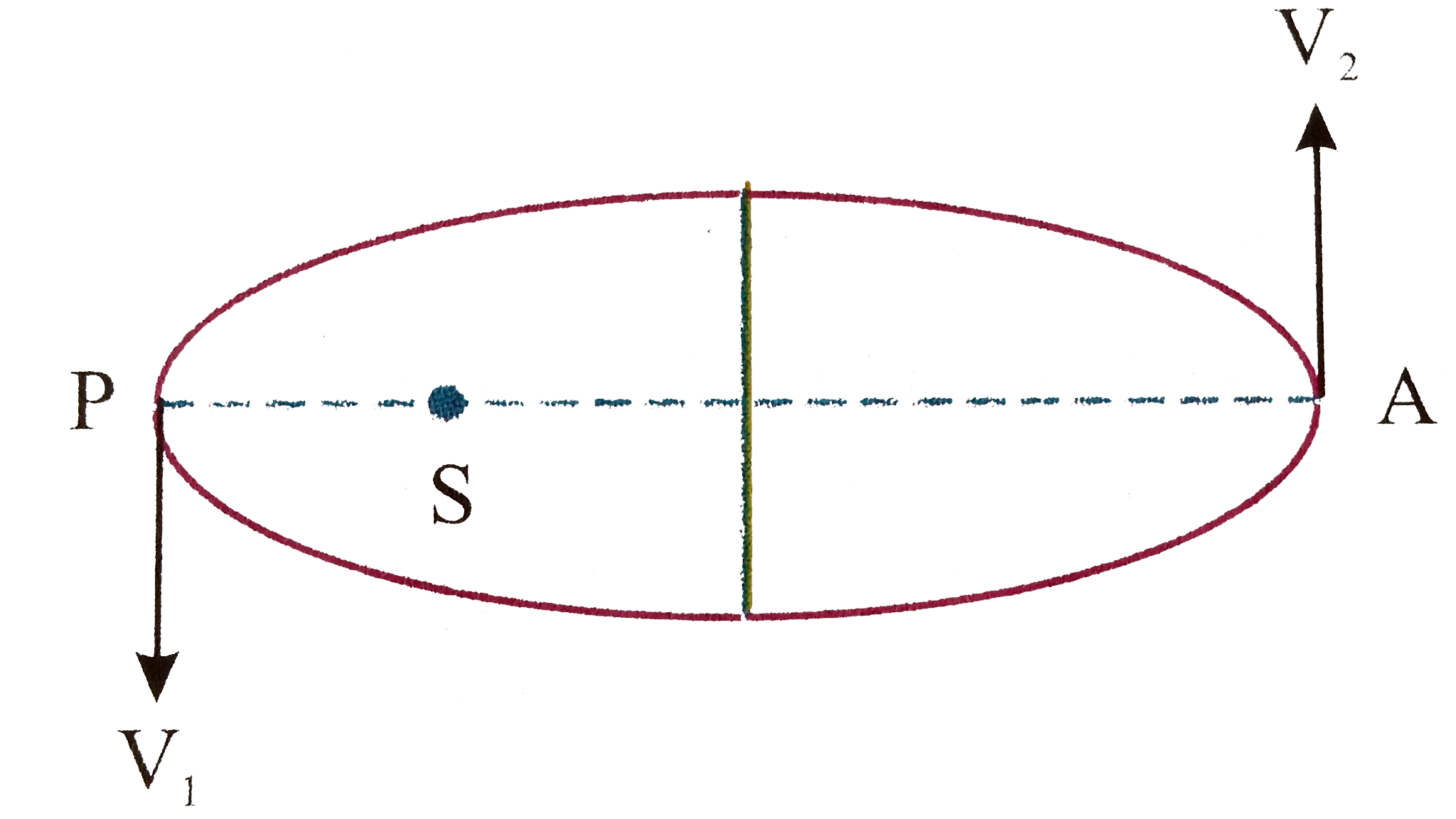Two planets of equal mass orbit a much massive star (figure). Planet m1 moves in circular orbit of radius 1×108km with period 2yr. Planet m2 moves in an elliptical orbit with closest distance r1=1×108km and farthest distance r2=1.8×108km, as shown.

(a) Using the fact that the mean radius of an elliptical orbit is the length of the semi-major axis, find the period of m2's orbit.
(b) Which planet has the greater speed at point P? Which has the greater total energy?
(c ) Compare the speed of planet m2 at P with that at A.
VP=2.4VA
VP=3.6VA
VP=4.2VA
VP=1.8VA
The correct Answer is:D
vr =constant t
Topper's Solved these Questions
- GRAVITATIONBook:NARAYNAChapter:GRAVITATIONExercise:LEVEL-VI
Explore 42 Videos
- GRAVITATIONBook:NARAYNAChapter:GRAVITATIONExercise:ILLUSTRATION
Explore 49 Videos
- GRAVITATIONBook:NARAYNAChapter:GRAVITATIONExercise:LEVEL-II (H.W)
Explore 32 Videos
- FRICTIONBook:NARAYNAChapter:FRICTIONExercise:Passage type of questions I
Explore 6 Videos
- KINETIC THEORY OF GASESBook:NARAYNAChapter:KINETIC THEORY OF GASESExercise:LEVEL-III(C.W)
Explore 52 Videos
Similar Questions
Two planets of equal mass orbit a much massive star (figure). Planet m1 moves in circular orbit of radius 1×108km with period 2yr. Planet m2 moves in an elliptical orbit with closed distance r1=1×108km and farthest distance r2=1.8×108km, as shows.

(a) Using the fact that the mean radius of an elliptical orbit is the length of the semi-major axis, find the period of m2's orbit.
(b) Which planet has the greater speed at point P? Which has the greater total energy?
(c ) Compare the speed of planet m2 at P with that at A.
View SolutionA satellite has to revolve round the earth in a circular orbit of radius 8×103 km. The velocity of projection of the satellite in this orbit will be -
View Solution
Knowledge Check
In elliptical orbit of a planet
Aangular momentum about centre of sun is constantBpotential energy is constantCkinetic energy is constantDtotal mechanical energy is constantThe electron in a hydrogen atom moves in a circular orbit of radius 5×10−11m with a speed of 0.67×108m/s Then
Athe frequency of revolutions of the electron is 6×10−15rev/sBthe electron carries −1.6×10(−19)C around the loopCthe current in the orbit is 0.96mADthe current flow in the opposite direction to the direction of motion of electronA planet is revolving around the Sun in an elliptical orbit. Its closest distance from the Sun is r and farthest distance is R. If the orbital velocity of the planet closest to the Sun is v, then what is the velocity at the farthest point?
AvrRBvRrCv√rRDv√Rr
A plenet moving along an elliptical orbit is closest to the sun at a distance r1 and farthest away at a distance of r2. If v1 and v2 are the linear velocities at these points respectively, then the ratio v1v2 is
View SolutionThe radius of orbit of a planet is two times that of the earth. The time period of planet is
View SolutionIf a planet of mass m is revolving around the sun in a circular orbit of radius r with time period, T then mass of the sun is
View Solution
A planet of mass m is moving in an elliptical orbit around the sun of mass M. The semi major axis of its orbit is a, eccentricity is e.
Find speed of planet V1 at perihelion P
View SolutionAll planets move in elliptical orbits with the sun situtated at one of the forci of the ellipse the point at wihich the planet is closest to the sun is
View Solution

